| Listing 1 - 10 of 10 |
Sort by
|
Book
ISBN: 9074698085 9789074698085 Year: 1994 Publisher: Amsterdam IFOTT
Abstract | Keywords | Export | Availability | Bookmark
 Loading...
Loading...Choose an application
- Reference Manager
- EndNote
- RefWorks (Direct export to RefWorks)
Mathematical linguistics --- Grammar --- Functionele grammatica. --- Natuurlijke-taalverwerking.
Dissertation
Abstract | Keywords | Export | Availability | Bookmark
 Loading...
Loading...Choose an application
- Reference Manager
- EndNote
- RefWorks (Direct export to RefWorks)
Doelstelling: De state-of-the-art NLP systemen zijn getraind en afgestemd op taal afkomstig uit traditionele tekstgenres, zoals bijvoorbeeld krantenmateriaal. Zodra deze worden toegepast op tekstmateriaal afkomstig uit sociale media, vertonen ze fouten en werken ze niet optimaal. Het doel van deze thesis bestaat erin om na te gaan hoe een dergelijk NLP systeem kan hertraind worden zodanig dat het afgestemd is op taal dat typerend is voor nieuwe media. Dit wordt gedaan aan de hand van een corpus, bestaande uit Nederlandse tweets, dat genormaliseerd en geanalyseerd wordt. Middelen of methode: Om ons onderzoek te realiseren werd een corpus samengesteld bestaande uit 250 tweets. Deze tweets werden manueel geselecteerd en zijn afkomstig van negen mensen die we gedurende een bepaalde periode gevolgd hebben op Twitter. Eenmaal de tweets verzameld waren, volgde de tokenisatie. Daarna werd ieder token genormaliseerd en geanalyseerd om zo hun taalkundige transformaties en eigenschappen te bepalen. In totaal werden vijf experimenten uitgevoerd die elk dieper ingaan op deze taalkundige transformaties en eigenschappen. Alle handelingen werden manueel uitgevoerd en ondersteund door richtlijnen die opgesteld zijn voor de normalisatie van SMS-data. Resultaten: Uit de vijf experimenten blijkt dat de taal gebruikt in tweets heel wat taalkundige transformaties en eigenschappen bevat die afwijken van de standaardtaal. Onder taalkundige transformaties verstaan we insertie, deletie, substitutie en transpositie van letters. Een grote meerderheid werd genormaliseerd aan de hand van inserties, wat inhoudt dat de voornaamste transformatie in tweets wordt veroorzaakt door de weglating van letters en/of woorden. Verder blijkt dat deze transformaties ook veeleer lexicaal dan grammaticaal zijn. Bij de taalkundige eigenschappen van tweets stellen we vast dat vreemde woorden en tussenwerpsels hier een relatief groot aandeel in hebben. De resultaten van dit onderzoek kunnen een basis vormen in de hertraining van NLP systemen op taal afkomstig uit nieuwe media. Verder onderzoek met grotere datasets is echter vereist om de bevindingen in deze studie beter te onderbouwen.
Corpusstudie. --- Natuurlijke taalverwerking. --- Nederlands. --- Normalisatie. --- Tweets.
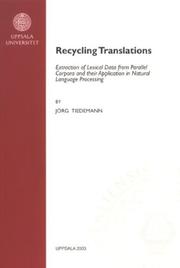
ISBN: 9155458157 Year: 2003 Publisher: Uppsala : Acta Universitatis Upsaliensis,
Abstract | Keywords | Export | Availability | Bookmark
 Loading...
Loading...Choose an application
- Reference Manager
- EndNote
- RefWorks (Direct export to RefWorks)
Automatisch vertalen. --- Corpus linguistics. --- Corpuslinguïstiek. --- Lexicografie. --- Natural language processing. --- Natuurlijke taalverwerking. --- Vertalen en technologie.
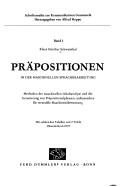
ISBN: 3427837718 9783427837718 Year: 1971 Volume: 1 8377 Publisher: Bonn: Dümmlers,
Abstract | Keywords | Export | Availability | Bookmark
 Loading...
Loading...Choose an application
- Reference Manager
- EndNote
- RefWorks (Direct export to RefWorks)
Mathematical linguistics --- Artificial intelligence. Robotics. Simulation. Graphics --- Translation science --- 800:311 --- Kwantitatieve linguistiek. Computerlinguistiek --- Grammar, Comparative and general --- Machine translating. --- Voorzetsels. --- Natuurlijke-taalverwerking. --- Prepositions. --- 800:311 Kwantitatieve linguistiek. Computerlinguistiek
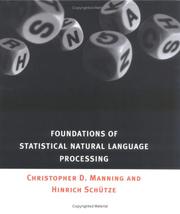
ISBN: 0262133601 0262312131 9780262133609 Year: 1999 Publisher: Cambridge, Mass.: MIT Press,
Abstract | Keywords | Export | Availability | Bookmark
 Loading...
Loading...Choose an application
- Reference Manager
- EndNote
- RefWorks (Direct export to RefWorks)
Computational linguistics --- Computerlinguïstiek --- Linguïstiek en gegevensverwerking --- Natural language processing --- Natuurlijke taalverwerking --- Taaltechnologie --- Statistical methods. --- statistische methodes --- Linguistique informatique --- Méthodes statistiques --- Linguïstiek en gegevensverwerking. --- Natural language processing. --- Natuurlijke taalverwerking. --- Taaltechnologie. --- statistische methodes. --- Mathematical linguistics --- Computer science --- #KVHA:Taalkunde --- -681.3*I27 --- Automatic language processing --- Language and languages --- Language data processing --- Linguistics --- Natural language processing (Linguistics) --- 681.3*I27 Natural language processing: language generation; language models; language parsing and understanding; machine translation; speech recognition and under-standing; text analysis (Artificial intelligence) --- Natural language processing: language generation; language models; language parsing and understanding; machine translation; speech recognition and under-standing; text analysis (Artificial intelligence) --- Statistical methods --- Data processing --- 681.3*I27 --- Applied linguistics --- Cross-language information retrieval --- Multilingual computing --- Méthodes statistiques --- Computational linguistics. --- Computational linguistics - Statistical methods --- natuurlijke taalverwerking --- automatische vertaling --- Statistische methodes.
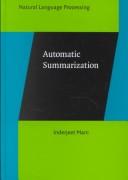
ISBN: 9027249857 1588110605 1588110591 9027249865 9786612163302 9027299102 1282163302 9789027299109 9789027249852 9789027249869 9781588110596 9781588110602 9781282163300 6612163305 Year: 2001 Publisher: Amsterdam Benjamins
Abstract | Keywords | Export | Availability | Bookmark
 Loading...
Loading...Choose an application
- Reference Manager
- EndNote
- RefWorks (Direct export to RefWorks)
With the explosion in the quantity of on-line text and multimedia information in recent years, there has been a renewed interest in automatic summarization. This book provides a systematic introduction to the field, explaining basic definitions, the strategies used by human summarizers, and automatic methods that leverage linguistic and statistical knowledge to produce extracts and abstracts. Drawing from a wealth of research in artificial intelligence, natural language processing, and information retrieval, the book also includes detailed assessments of evaluation methods and new topics such as multi-document and multimedia summarization. Previous automatic summarization books have been either collections of specialized papers, or else authored books with only a chapter or two devoted to the field as a whole. This is the first textbook on the subject, developed based on teaching materials used in two one-semester courses. To further help the student reader, the book includes detailed case studies, accompanied by end-of-chapter reviews and an extensive glossary.Audience: students and researchers, as well as information technology managers, librarians, and anyone else interested in the subject.
Mathematical linguistics --- Information retrieval --- Artificial intelligence. Robotics. Simulation. Graphics --- Automatic abstracting --- Library & Information Science --- Social Sciences --- Automatic abstracting. --- Conflict management --- Violence --- Social conflict --- Conflict control --- Conflict resolution --- Dispute settlement --- Management of conflict --- Managing conflict --- Management --- Negotiation --- Problem solving --- Crisis management --- Automatisch samenvatten. --- Computerlinguïstiek. --- Linguïstiek en gegevensverwerking. --- Natural language processing. --- Natuurlijke taalverwerking. --- Taaltechnologie.
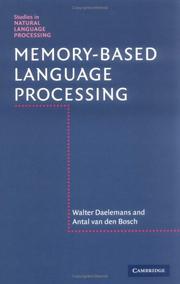
ISBN: 0521808901 9780521808903 9780511486579 9780521114455 0511191197 9780511191190 0511160143 9780511160141 0511160712 9780511160714 0511161425 9780511161421 051148657X 9786610458240 6610458243 1107144043 9781107144040 1280458240 9781280458248 0511300441 9780511300448 0521114454 Year: 2005 Publisher: Cambridge Cambridge University Press
Abstract | Keywords | Export | Availability | Bookmark
 Loading...
Loading...Choose an application
- Reference Manager
- EndNote
- RefWorks (Direct export to RefWorks)
Memory-based language processing - a machine learning and problem solving method for language technology - is based on the idea that the direct reuse of examples using analogical reasoning is more suited for solving language processing problems than the application of rules extracted from those examples. This book discusses the theory and practice of memory-based language processing, showing its comparative strengths over alternative methods of language modelling. Language is complex, with few generalizations, many sub-regularities and exceptions, and the advantage of memory-based language processing is that it does not abstract away from this valuable low-frequency information. By applying the model to a range of benchmark problems, the authors show that for linguistic areas ranging from phonology to semantics, it produces excellent results. They also describe TiMBL, a software package for memory-based language processing. The first comprehensive overview of the approach, this book will be invaluable for computational linguists, psycholinguists and language engineers.
Artificial intelligence. Robotics. Simulation. Graphics --- Mathematical linguistics --- Computational linguistics --- Learning, Psychology of --- Natural language processing (Computer science) --- 800:311 --- 800:311 Kwantitatieve linguistiek. Computerlinguistiek --- Kwantitatieve linguistiek. Computerlinguistiek --- NLP (Computer science) --- Artificial intelligence --- Electronic data processing --- Human-computer interaction --- Semantic computing --- Learning --- Psychology of learning --- Educational psychology --- Comprehension --- Learning ability --- Automatic language processing --- Language and languages --- Language data processing --- Linguistics --- Natural language processing (Linguistics) --- Applied linguistics --- Cross-language information retrieval --- Multilingual computing --- Psychological aspects --- Data processing --- Human-computer interaction. --- Computer-human interaction --- Human factors in computing systems --- Interaction, Human-computer --- Human engineering --- User-centered system design --- User interfaces (Computer systems) --- Computational linguistics. --- Learning, Psychology of. --- Computerlinguïstiek. --- Linguïstiek en gegevensverwerking. --- Natural language processing. --- Natuurlijke taalverwerking. --- Taaltechnologie. --- Arts and Humanities --- Language & Linguistics
Book
ISBN: 9780521874151 0521874157 9780511815829 1107210631 9786612653315 0511689845 0511691327 1139637568 0511690584 0511815824 0511689101 1282653318 0511692447 9780511692444 9780511689109 9780511691324 9780511690587 9781107210639 9781139637565 9781282653313 6612653310 9780511689840 Year: 2010 Publisher: Cambridge: Cambridge university press,
Abstract | Keywords | Export | Availability | Bookmark
 Loading...
Loading...Choose an application
- Reference Manager
- EndNote
- RefWorks (Direct export to RefWorks)
The dream of automatic language translation is now closer thanks to recent advances in the techniques that underpin statistical machine translation. This class-tested textbook from an active researcher in the field, provides a clear and careful introduction to the latest methods and explains how to build machine translation systems for any two languages. It introduces the subject's building blocks from linguistics and probability, then covers the major models for machine translation: word-based, phrase-based, and tree-based, as well as machine translation evaluation, language modeling, discriminative training and advanced methods to integrate linguistic annotation. The book also reports the latest research, presents the major outstanding challenges, and enables novices as well as experienced researchers to make novel contributions to this exciting area. Ideal for students at undergraduate and graduate level, or for anyone interested in the latest developments in machine translation.
82.03 --- 681.3*I27 --- 681.3*I27 Natural language processing: language generation language models language parsing and understanding machine translation speech recognition and under-standing text analysis (Artificial intelligence) --- Natural language processing: language generation language models language parsing and understanding machine translation speech recognition and under-standing text analysis (Artificial intelligence) --- 82.03 Vertalen. Literaire vertaling --- Vertalen. Literaire vertaling --- Automatisch vertalen. --- Machine translation. --- Natural language processing. --- Natuurlijke taalverwerking. --- 681.3*J --- 681.3*J Computer applications --- Computer applications --- Machine translating --- Automatic translating --- Computer translating --- Electronic translating --- Mechanical translating --- Algorithms --- Applied linguistics --- Artificial intelligence --- Natural language generation (Computer science) --- Information theory --- Translating and interpreting --- Cross-language information retrieval --- Translating machines --- 681.3*I27 Natural language processing: language generation; language models; language parsing and understanding; machine translation; speech recognition and under-standing; text analysis (Artificial intelligence) --- Natural language processing: language generation; language models; language parsing and understanding; machine translation; speech recognition and under-standing; text analysis (Artificial intelligence) --- Mathematical linguistics --- Artificial intelligence. Robotics. Simulation. Graphics --- Translation science --- Data processing --- Information Technology --- Computer Science (Hardware & Networks) --- General and Others --- Translating and interpreting - Data processing --- Machine translating. --- Data processing. --- Interpretation and translation --- Interpreting and translating --- Language and languages --- Literature --- Translation and interpretation --- Translators --- Translating
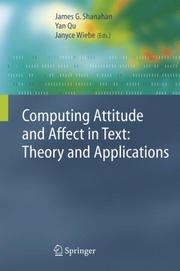
ISBN: 1402040261 1402041020 1280460156 9786610460151 9400792573 Year: 2006 Publisher: Dordrecht ; [Great Britain] : Springer,
Abstract | Keywords | Export | Availability | Bookmark
 Loading...
Loading...Choose an application
- Reference Manager
- EndNote
- RefWorks (Direct export to RefWorks)
Human Language Technology (HLT) and Natural Language Processing (NLP) systems have typically focused on the “factual” aspect of content analysis. Other aspects, including pragmatics, opinion, and style, have received much less attention. However, to achieve an adequate understanding of a text, these aspects cannot be ignored. The chapters in this book address the aspect of subjective opinion, which includes identifying different points of view, identifying different emotive dimensions, and classifying text by opinion. Various conceptual models and computational methods are presented. The models explored in this book include the following: distinguishing attitudes from simple factual assertions; distinguishing between the author’s reports from reports of other people’s opinions; and distinguishing between explicitly and implicitly stated attitudes. In addition, many applications are described that promise to benefit from the ability to understand attitudes and affect, including indexing and retrieval of documents by opinion; automatic question answering about opinions; analysis of sentiment in the media and in discussion groups about consumer products, political issues, etc. ; brand and reputation management; discovering and predicting consumer and voting trends; analyzing client discourse in therapy and counseling; determining relations between scientific texts by finding reasons for citations; generating more appropriate texts and making agents more believable; and creating writers’ aids. The studies reported here are carried out on different languages such as English, French, Japanese, and Portuguese. Difficult challenges remain, however. It can be argued that analyzing attitude and affect in text is an “NLP”-complete problem.
Computational linguistics. --- Computerlinguïstiek. --- Computing attitude. --- Information retrieval --- Information storage and retrieval systems --- Lexicologie --- Lexicology --- Linguistic models --- Linguïstische modellen --- Natural language processing (Computer science). --- Natural language processing. --- Natuurlijke taalverwerking. --- Pattern recognition systems. --- Taaltechnologie. --- gegevensverwerking. --- Data processing. --- gegevensverwering. --- Computer science. --- Library science. --- Information storage and retrieval. --- Artificial intelligence. --- Computer Science. --- Information Storage and Retrieval. --- Library Science. --- Computer Science, general. --- Information Systems Applications (incl. Internet). --- Artificial Intelligence (incl. Robotics). --- Language Translation and Linguistics. --- Automatic language processing --- Language and languages --- Language data processing --- Linguistics --- Natural language processing (Linguistics) --- Applied linguistics --- Cross-language information retrieval --- Mathematical linguistics --- Multilingual computing --- AI (Artificial intelligence) --- Artificial thinking --- Electronic brains --- Intellectronics --- Intelligence, Artificial --- Intelligent machines --- Machine intelligence --- Thinking, Artificial --- Bionics --- Cognitive science --- Digital computer simulation --- Electronic data processing --- Logic machines --- Machine theory --- Self-organizing systems --- Simulation methods --- Fifth generation computers --- Neural computers --- Librarianship --- Library economy --- Bibliography --- Documentation --- Information science --- Informatics --- Science --- Data processing --- Text processing (Computer science) --- Processing, Text (Computer science) --- Database management --- Word processing --- Automatic data storage --- Automatic information retrieval --- Automation in documentation --- Computer-based information systems --- Data processing systems --- Data storage and retrieval systems --- Discovery systems, Information --- Information discovery systems --- Information processing systems --- Information retrieval systems --- Machine data storage and retrieval --- Mechanized information storage and retrieval systems --- Computer systems --- Electronic information resources --- Data libraries --- Digital libraries --- Information organization --- Information Technology --- Computer Science (Hardware & Networks) --- Computational linguistics --- Natural language processing (Computer science) --- Pattern recognition systems --- Pattern classification systems --- Pattern recognition computers --- Pattern perception --- Computer vision --- Models, Linguistic --- Typology (Linguistics) --- NLP (Computer science) --- Artificial intelligence --- Human-computer interaction --- Semantic computing --- Computing attitude --- Information storage and retrieva. --- Artificial Intelligence. --- Natural Language Processing (NLP). --- Information storage and retrieval systems. --- Application software. --- Application computer programs --- Application computer software --- Applications software --- Apps (Computer software) --- Computer software --- Data centers
Book
ISBN: 9789004351783 9789004351790 9004351795 9004351787 Year: 2018 Volume: 45 Publisher: Leiden: Brill,
Abstract | Keywords | Export | Availability | Bookmark
 Loading...
Loading...Choose an application
- Reference Manager
- EndNote
- RefWorks (Direct export to RefWorks)
Trends in E-Tools and Resources for Translators and Interpreters offers a collection of contributions from key players in the field of translation and interpreting that accurately outline some of the most cutting-edge technologies in this field that are available or under development at the moment in both professional and academic contexts.Particularly, this volume provides a wide picture of the state of the art, looking not only at the world of technology for translators but also at the hitherto overlooked world of technology for interpreters. This volume is accessible and comprehensive enough to be of benefit to different categories of readers: scholars, professionals and trainees.Contributors are: Pierrette Bouillon, Gloria Corpas Pastor, Hernani Costa, Isabel Durán-Muñoz, Claudio Fantinuoli, Johanna Gerlach, Joanna Gough, Asheesh Gulati, Veronique Hoste, Amélie Josselin, David Lewis, Lieve Macken, John Moran, Aurelie Picton, Emmanuel Planas, Éric Poirier, Victoria Porro, Celia Rico Pérez, Christian Saam, Pilar Sánchez-Gijón, Míriam Seghiri Domínguez, Violeta Seretan, Arda Tezcan, Olga Torres, and Anna Zaretskaya.
#KVHA:Vertaalwetenschap --- #KVHA:Tolken --- #KVHA:E-tools --- Mathematical linguistics --- Translation science --- Computer. Automation --- E-tools, --- Translating and interpreting --- Technological innovations. --- Computer network resources. --- Data processing. --- Vertalen en technologie. --- Vertalen. --- Technological innovations --- Computer network resources --- Data processing --- E-books --- FOREIGN LANGUAGE STUDY --- LANGUAGE ARTS & DISCIPLINES --- Multi-Language Phrasebooks. --- Alphabets & Writing Systems. --- Grammar & Punctuation. --- Linguistics --- General. --- Readers. --- Spelling. --- Interpretation and translation --- Interpreting and translating --- Language and languages --- Literature --- Translation and interpretation --- Translators --- Translating --- interpreting --- natural language processing --- machine translation --- mašīntulkošana --- tradução automática --- maskinöversättning --- strojno prevajanje --- strojový preklad --- traduzione automatica --- masintõlge --- strojový překlad --- koneellinen kääntäminen --- automatisk oversættelse --- përkthim automatik --- машинен превод --- automatische vertaling --- αυτόματη μετάφραση --- meaisínaistriúchán --- tłumaczenie automatyczne --- машинско превођење --- traduction automatique --- strojno prevođenje --- traduzzjoni awtomatika --- traducción automática --- машински превод --- traducere automată --- mašininis vertimas --- gépi fordítás --- automatische Übersetzung --- arvutipõhine tõlkesüsteem --- EUROTRA --- fordítói memória --- strojni prijevod --- počítačový překlad --- computerunterstützte Übersetzung --- računalno podržano prevođenje --- maschinelle Übersetzung --- computerised translation system --- automatinis vertimas --- datorizēta tulkošanas sistēma --- kompiuterizuota vertimo sistema --- számítógépes fordítás --- automaattinen kielenkääntöjärjestelmä --- počítačový systému prekladu --- računalni sustav za prevođenje --- sistem i komjuterizuar përkthimi --- edb-oversættelse --- автоматско преведување --- обработка на естествен език --- elaborazione del linguaggio naturale --- luonnollisen kielen käsittely --- obrada prirodnog jezika --- természetesnyelv-feldolgozás --- Verarbeitung natürlicher Sprache --- loomuliku keele töötlus --- processamento da língua natural --- natursprogsbehandling --- obdelava naravnega jezika --- przetwarzanie języka naturalnego --- procesarea limbajului natural --- ipproċessar tallingwaġġ naturali --- dabiskās valodas apstrāde --- zpracování přirozeného jazyka --- procesamiento del lenguaje natural --- traitement automatique des langues --- επεξεργασία φυσικών γλωσσών --- próiseáil teanga nádúrtha --- natuurlijke-taalverwerking --- spracovanie prirodzeného jazyka --- natūraliosios kalbos apdorojimas --- bearbetning av naturligt språk --- tratamento da língua natural --- procesiranje naravnega jezika --- természetes nyelvi feldolgozás --- natuurlijketaalverwerking --- NLP --- természetes nyelvek feldolgozása --- maschinelle Sprachverarbeitung --- обработка на естествените езици --- обработка на естествения език --- interpretação --- tłumaczenie symultaniczne --- përkthim me gojë --- interprétation --- толкување --- тумачење --- interpretazione --- превеждане --- tolken --- suuline tõlge --- vertimas žodžiu --- tumačenje --- tolkning --- tlmočenie --- sinhronā tulkošana --- tulkkaus --- interpretazzjoni --- interpretación --- interpretare --- tolmácsolás --- tlumočení --- διερμηνεία --- ateangaireacht --- Dolmetschen --- tolmačenje --- simultano prevođenje --- usmeno prevođenje --- sinhronā tulkošana mutvārdos --- szinkrontolmácsolás --- interpretazione consecutiva --- консекутивно толкување --- interpretation --- interpretazione simultanea --- tlumočník --- relétolmácsolás --- ústní převod --- simultánne tlmočenie --- симултано толкување --- konsekutiva --- konsekutivtolkning --- sünkroontõlge --- interpretação consecutiva --- simultánní tlumočení --- përkthim simultan --- simultaan tolken --- konsekutivní tlumočení --- simultaanitulkkaus --- kabinové tlumočení --- konferencijsko prevođenje --- konszekutív tolmácsolás --- interprétation simultanée --- konferenciatolmácsolás --- interpretare simultană --- Simultandolmetschen --- konsekutiv tolkning --- konferenční tlumočení --- interpretación simultánea --- simultaneous interpreting --- interpretação simultânea --- soudní tlumočení --- ταυτόχρονη διερμηνεία --- szimultán tolmácsolás --- simultantolkning --- követő tolmácsolás --- sinchroninis vertimas --- Translating and interpreting - Technological innovations --- Translating and interpreting - Computer network resources --- Translating and interpreting - Data processing
| Listing 1 - 10 of 10 |
Sort by
|

 Search
Search Feedback
Feedback About UniCat
About UniCat  Help
Help News
News